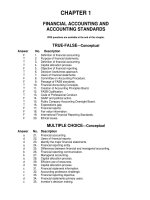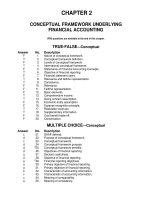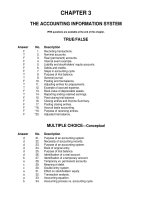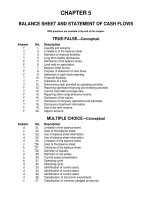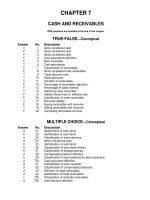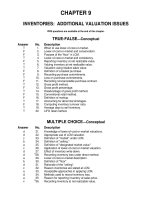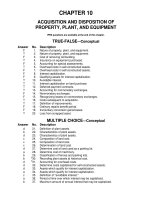Test bank cost accounting 14e by carter ch03
Bạn đang xem bản rút gọn của tài liệu. Xem và tải ngay bản đầy đủ của tài liệu tại đây (155.86 KB, 21 trang )
Chapter 3
COST BEHAVIOR ANALYSIS
MULTIPLE CHOICE
Question Nos. 12-14 and 20-25 are AICPA adapted.
Question Nos. 16-19 and 28 are ICMA adapted.
Question Nos. 15, 26, and 28 are CIA adapted.
D
1.
Expenses that require a series of payments over a long period of timeCsuch as
long-term debt and lease rentalsCare frequently known as:
A.
programmed fixed expenses
B.
avoidable expenses
C.
variable expenses
D.
committed fixed expenses
E.
normal capacity expenses
C
2.
A mathematical technique used to fit a straight line to a set of plotted points is:
A.
integral calculus
B.
the EOQ model
C.
the method of least squares
D.
linear programming
E.
PERT network analysis
E
3.
One
A.
B.
C.
D.
E.
advantage of using multiple regression analysis is that:
computations are simplified
only two data points need be considered
a two-dimensional graph may be used to show cost relationships
costs may be grouped into one independent variable
the effects of several variables on costs may be analyzed
B
4.
The
A.
B.
C.
D.
E.
coefficient of determination indicates:
causal relationships among costs and other factors
the percentage of explained variance in the dependent variable
the linear relationship between two variables
whether several variables fluctuate
the size of the standard deviation
16
17
E
Chapter 3
5.
Hoyden Co. developed the following equation to predict certain components of its
budget for the coming period:
Costs = $50,000 + ($5 x direct labor hours)
The
A.
B.
C.
D.
E.
$5 would approximate:
total cost
direct labor rate per hour
fixed cost per direct labor hour
the coefficient of determination
variable costs per direct labor hour
E
6.
When cost relationships are linear, total variable manufacturing costs will vary in
proportion to changes in:
A.
machine hours
B.
direct labor hours
C.
total material cost
D.
total overhead cost
E.
volume of production
B
7.
The term "relevant range" as used in cost accounting means the range over
which:
A.
relevant costs are incurred
B.
cost relationships are valid
C.
costs may fluctuate
D.
sales volume fluctuates
E.
production may vary
E
8.
Within a relevant range, the amount of fixed cost per unit:
A.
differs at each production level on a per-unit basis
B.
remains constant in total
C.
decreases as production increases on a per-unit basis
D.
increases as production decreases on a per-unit basis
E.
all of the above
C
9.
The following relationships pertain to a year's budgeted activity for Buckeye
Company:
Direct labor hours.............................................
Total costs.........................................................
What are the budgeted fixed costs for the year?
A.
$100,000
B.
$25,000
C.
$54,000
D.
$75,000
E.
none of the above
High
400,000
$154,000
Low
300,000
$129,000
Cost Behavior Analysis
18
SUPPORTING CALCULATION:
High..................................................................
Low...................................................................
Difference.........................................................
$154,000
129,000
$ 25,000
400,000
300,000
100,000
Variable rate = $25,000 100,000 = $.25/direct labor hour
Fixed cost = $154,000 - $.25(400,000) = $54,000
B
10.
Maintenance expenses of a company are to be analyzed for purposes of
constructing a flexible budget. Examination of past records disclosed the
following costs and volume measures:
Cost per month.................................................
Machine hours..................................................
High
$39,200
24,000
Low
$32,000
15,000
Using the high-low method of analysis, the estimated variable cost per machine
hour is:
A.
$12.50
B.
$0.80
C.
$0.08
D.
$1.25
E.
none of the above
SUPPORTING CALCULATION:
High..................................................................
Low...................................................................
Difference.........................................................
$ 39,200
32,000
$ 7,200
24,000
15,000
9,000
Variable rate = $7,200 / 9,000 = $.80/machine hour
D
11.
A company allocates its variable factory overhead based on direct labor hours.
During the past three months, the actual direct labor hours and the total factory
overhead allocated were as follows:
Direct labor hours........................
Total factory
overhead allocated................
October
2,500
November
3,000
December
5,000
$80,000
$75,000
$100,000
Based upon this information, the estimated variable cost per direct labor hour
was:
A.
$.125
B.
$12.50
C.
$.08
D.
$8
E.
none of the above
19
Chapter 3
SUPPORTING CALCULATION:
High..................................................................
Low...................................................................
Difference.........................................................
$100,000
75,000
$ 25,000
5,000
2,500
2,500
Variable rate = $20,000 2,500 = $8.00/direct labor hour
A
12.
The technique that can be used to determine the variable and fixed portions of a
company's costs is:
A.
scattergraph method
B.
poisson analysis
C.
linear programming
D.
game theory
E.
queuing theory
A
13.
The
A.
B.
C.
D.
E.
C
14.
Multiple regression analysis:
A.
is not a sampling technique
B.
involves the use of independent variables only
C.
assumes that the independent variables are not correlated
D.
establishes a cause-and-effect relationship
E.
all of the above
E
15.
For a simple regression-analysis model that is used to allocate factory overhead,
an internal auditor finds that the intersection of the line of best fit for the
overhead allocation on the y-axis is $50,000. The slope of the trend line is .20.
The independent variable, factory wages, amounts to $900,000 for the month.
What is the estimated amount of factory overhead to be allocated for the month?
A.
$910,000
B.
$950,000
C.
$ 50,000
D.
$180,000
E.
$230,000
number of variables used in simple regression analysis is:
two
three
more than three
three or less
one
SUPPORTING CALCULATION:
Factory overhead = $50,000 + .2($900,000) = $230,000
y
x
y
x
y
y
x
y
x
(r)
r
r
r
r
except
PROBLEMS
PROBLEM
High and Low Points Method
Required:
SOLUTION
PROBLEM
Fixed, Variable, and Semivariable Production Costs
Required:
SOLUTION
PROBLEM
Statistical Scattergraph
Required
SOLUTION
PROBLEM
Method of Least Squares
Required:
SOLUTION
y
yn
x
xn
PROBLEM
Coefficients of Correlation and Determination
Required:
r
Note to instructor:
SOLUTION
r
PROBLEM
Standard Error of the Estimate and Confidence Interval Estimation
( (xi-xi)2)
( (yi-
2
yi) )
Required:
SOLUTION
PROBLEM
Method of Least Squares
Required:
(r)
SOLUTION
y
a
a
a
a
bx
(r )
y
x
